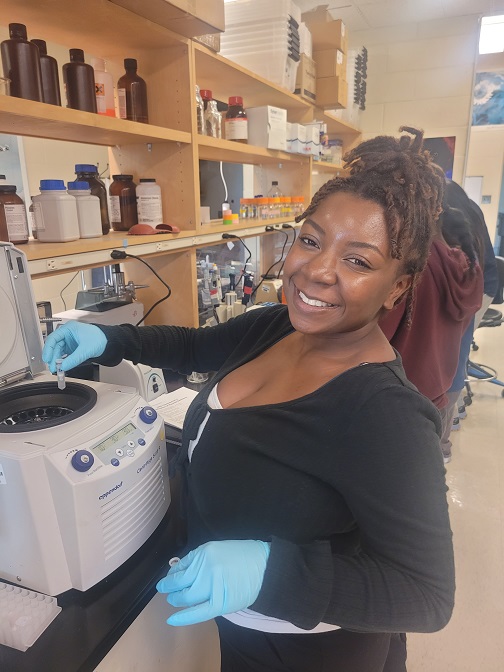
Illuminating the Path
June 15, 2023
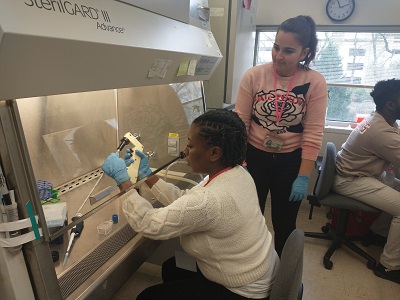 Vincent Van Gogh's name echoes through history for his masterpiece Starry Night. Along with his undeniable mark on the art world, Gogh also shared profound messages through his poetry. In his collection of poems, My Life & Love Are One, he declares “Whosoever loves much, performs much, and can accomplish much, and what is done in love is well done.” These words resonate deeply within me as I reflect on the path that led me to the Fox Chase Cancer Center. My name is Oviyanna Umoh, known as Ovi to most. As a rising sophomore at the University of Delaware's Honors College, I am pursuing a double major in Neuroscience and Psychology.
Vincent Van Gogh's name echoes through history for his masterpiece Starry Night. Along with his undeniable mark on the art world, Gogh also shared profound messages through his poetry. In his collection of poems, My Life & Love Are One, he declares “Whosoever loves much, performs much, and can accomplish much, and what is done in love is well done.” These words resonate deeply within me as I reflect on the path that led me to the Fox Chase Cancer Center. My name is Oviyanna Umoh, known as Ovi to most. As a rising sophomore at the University of Delaware's Honors College, I am pursuing a double major in Neuroscience and Psychology.
From a young age, my passion for knowledge and academia became evident. While I may not be destined to become a teacher, my five-year-old self would still be thrilled to know that I will continue to educate and inspire others. It was during middle school that my science teacher recognized my insatiable curiosity and encouraged me to participate in local science fairs. Months spent researching captivating topics from the physics of polarization to the phenomenon of phantom limb sensations instilled the value of scientific inquiry and experimentation in me.
Another guiding light in my journey was my aunt. Hearing her tales of long days in the lab and subsequent celebration of her doctorate degree in Neuroscience was more than enough to catapult me into chasing my own similar goals. As I entered college, securing an internship became my primary goal. Religiously checking my email, hope filled my heart when I stumbled upon one introducing the UD-FCCC fellowship to Psychology and Neuroscience majors. Despite my notorious procrastination, I immediately followed the steps in the email and registered to attend a Discovery Day visit.
Undeniably, anxiety clouded my mind during the visit. The majority of my peers were older, more experienced biology or chemistry majors—I didn’t even know how to hold a pipette correctly. However, my anxiety would quickly dissipate when Dr. Purdy expressed fascination with my interest in Psychology. Instead of feeling inadequate, I began to realize the value of merging psychology with cancer research. The more I interacted with the staff at Fox Chase, the more comfortable I became. It was during this Discovery Day visit that I had the privilege of working with Dr. Floriana Mulas. Despite my limited knowledge of molecular lab research, I was greeted with genuine gratitude and hospitality from Dr. Mulas. This sentiment truly solidified my interest in pursuing this summer fellowship at the Fox Chase Cancer Center.
Even after submitting my application, receiving an offer from the fellowship seemed like a shot in the dark. Fortunately for me, it found its target. Just a few weeks after my birthday, I saw a congratulations email in my mailbox. Slightly belated, but what an amazing birthday gift that was. I’ll never forget the pure joy on my mom’s face after telling her.
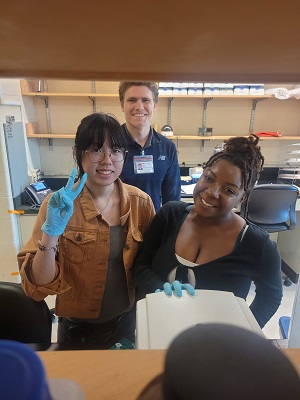 My life was rapidly transforming, mostly for the better. Moving to Philadelphia was a monumental change, but one I swiftly embraced. Orientation began the day after moving to Philadelphia, resurrecting the early morning wake-up calls I hadn't experienced since high school. The first week involved intensive lab experiments, discussions, lectures, and assignments. While overwhelming at the time, I now appreciate how it has prepared me for conducting research in my own lab.
My life was rapidly transforming, mostly for the better. Moving to Philadelphia was a monumental change, but one I swiftly embraced. Orientation began the day after moving to Philadelphia, resurrecting the early morning wake-up calls I hadn't experienced since high school. The first week involved intensive lab experiments, discussions, lectures, and assignments. While overwhelming at the time, I now appreciate how it has prepared me for conducting research in my own lab.
I have been evermore fortunate to be a part of Dr. Amy Whitaker’s lab at Fox Chase Cancer Center. The matching process for our labs took into account personality, learning style, and mentorship goals, and I couldn't envision a more perfect match. Dr. Whitaker's research focuses on molecular therapeutics and cancer epigenetics, and her passion for DNA repair and g-quadruplexes is unparalleled. Assisting her in her lab this summer is an immense honor. My research will revolve around the D283G mutation found in individuals with the neurodegenerative disease Amyotrophic Lateral Sclerosis (ALS).
Thus far, I have realized that my love for research and thirst for knowledge has led me to this remarkable opportunity. I firmly believe that anything pursued with love is destined to be done well. I am eagerly anticipating the ways in which working in Dr. Whitaker's lab will shape and transform my career and aspirations.
Exploring the Art of Science
July 7, 2023
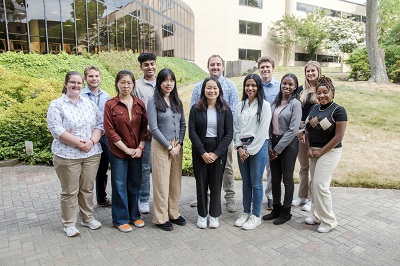 In just a month, my knowledge has expanded, and I have ventured into new realms of research and science. On my very first day in Dr. Whitaker’s lab, I jumped straight into working on my project. I apprehensively anticipated long days of sitting at a desk taking the backseat on my project, but that was not the case. That morning, I was welcomed with open arms into the world of research and the smell of E. coli. Initially doubting my laboratory skills, I soon realized that this lab was where I belonged. Everyone in the lab dedicated themselves to enriching my learning experiences and making me feel comfortable.
In just a month, my knowledge has expanded, and I have ventured into new realms of research and science. On my very first day in Dr. Whitaker’s lab, I jumped straight into working on my project. I apprehensively anticipated long days of sitting at a desk taking the backseat on my project, but that was not the case. That morning, I was welcomed with open arms into the world of research and the smell of E. coli. Initially doubting my laboratory skills, I soon realized that this lab was where I belonged. Everyone in the lab dedicated themselves to enriching my learning experiences and making me feel comfortable.
During my initial weeks, I focused on preparing my project. I learned various techniques such as mutagenesis to create proteins, protein growth and expression, protein lysis through sonication, and protein purification. I appreciated the patience and kindness as I navigated through new techniques. Equally important was the eagerness of my mentors to assist in my learning. Through these experiences, I not only acquired a plethora of new research skills but also understood the significance of each technique.
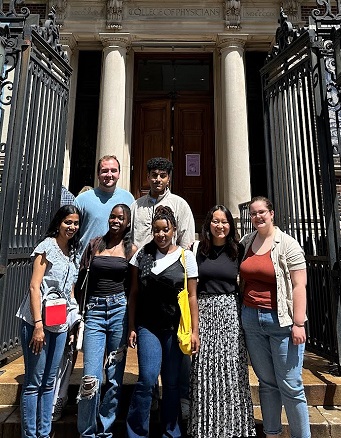 In my spare time, I delved into scientific articles. Initially, reading scientific papers felt tedious and overwhelming. However, after attending workshops with Dr. Purdy and Dr. Leystra, the process became more manageable. Dr. Whitaker recommended many of her own works which were easier to read and aided immensely in my understanding of my project. Knowing that I could approach Amy at any time to ask questions was reassuring. Prior to this internship, I knew very little about cancer biology or biochemistry. However, I never felt ashamed or embarrassed for asking questions. Experimenting, reading, and asking questions have been invaluable sources of learning for me.
In my spare time, I delved into scientific articles. Initially, reading scientific papers felt tedious and overwhelming. However, after attending workshops with Dr. Purdy and Dr. Leystra, the process became more manageable. Dr. Whitaker recommended many of her own works which were easier to read and aided immensely in my understanding of my project. Knowing that I could approach Amy at any time to ask questions was reassuring. Prior to this internship, I knew very little about cancer biology or biochemistry. However, I never felt ashamed or embarrassed for asking questions. Experimenting, reading, and asking questions have been invaluable sources of learning for me.
My project aims to further research on genetic variations in DNA repair genes. Amyotrophic Lateral Sclerosis (ALS) is a rare neurological disease that impacts around 5,000 Americans annually. This condition primarily affects the body’s motor neurons which are responsible for voluntary movements such as walking, talking, and chewing. Despite its significant impact on individuals, ALS remains under-researched and underrepresented in biomedical studies.
Our bodies and cells naturally accumulate endogenous damage. To combat this, we have an important protein specialized for the job. Apurinic/apyrimidinic endonuclease (APE1) is an enzyme involved in Base Excision Repair (BER). Within this mechanism, APE1’s primary function is to create an incision in the phosphodiester backbone of the AP site, allowing for the addition of a new base and the overall repair of the DNA. When the shape of APE1 is altered, DNA damage continues and human disease may arise.
In a previous study, scientists found that an APE1 variation, D283G, was present in an individual with ALS. Although it has not been studied, it has been hypothesized that D283G will have reduced functionality compared to natural APE1. Through techniques like x-ray crystallography, enzyme kinetics, and protein binding, I will explore the structure and functionality of the D283G variant in APE1.
X-ray crystallography was an entirely new technique for me. During my first few weeks, I vividly remember seeing Amy searching for her own crystals under the microscope. Little did I know, I would find myself sitting in the same seat someday.
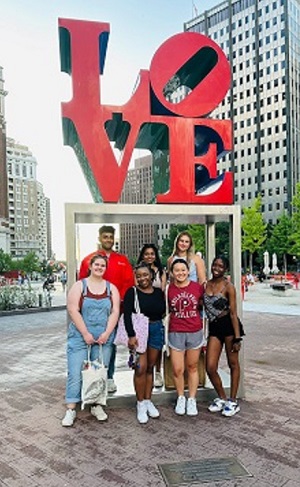 Each day that I arrive at Fox Chase, I look forward to peering under the microscope– even if my crystals don’t end up forming! The process of crystal formation surprises me with its kaleidoscope of colors. The ethereal blend of purple hues with greens and blues is widely psychedelic. It's inspiring to merge my love for art with my passion for science.
Each day that I arrive at Fox Chase, I look forward to peering under the microscope– even if my crystals don’t end up forming! The process of crystal formation surprises me with its kaleidoscope of colors. The ethereal blend of purple hues with greens and blues is widely psychedelic. It's inspiring to merge my love for art with my passion for science.
In my free time, I also like to bridge my interests with science. Our group of fellows organized a trip to the Mütter Museum in the city center. There, I learned extensively about medical history and scientific discoveries. It was fascinating to connect the knowledge I gained at Fox Chase with the medical cases I encountered at the museum. Moving forward, we plan to explore more museums, amusement parks, and botanical gardens.
Most of all, I eagerly anticipate the final symposium in August. Whether it's presenting to my roommate or sharing my research with Dr. Purdy and Dr. Leystra, I find great joy in communicating my findings to an audience. It is an immensely rewarding experience. I cannot wait to show my family and friends the project I dedicated so much time and effort towards. I will walk away from this fellowship with many lessons learned.
The Path Forward
August 25, 2023
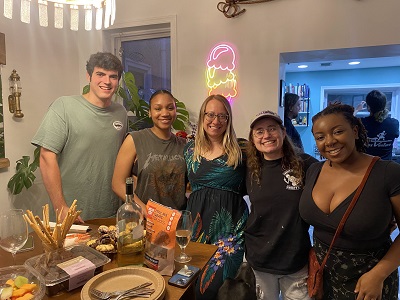 As my time at Fox Chase Cancer Center comes to an end, I reflect deeply on the invaluable lessons and experiences that have shaped my perspective. When I first arrived, the world of research felt intimidatingly complex. Yet, through each new technique I learned and project I assisted with, my confidence steadily grew. Now, procedures like pipetting, analyzing data, and reading scientific papers feel like second nature. Most importantly, I have gained a greater appreciation for the scientific process and the immense dedication it requires.
As my time at Fox Chase Cancer Center comes to an end, I reflect deeply on the invaluable lessons and experiences that have shaped my perspective. When I first arrived, the world of research felt intimidatingly complex. Yet, through each new technique I learned and project I assisted with, my confidence steadily grew. Now, procedures like pipetting, analyzing data, and reading scientific papers feel like second nature. Most importantly, I have gained a greater appreciation for the scientific process and the immense dedication it requires.
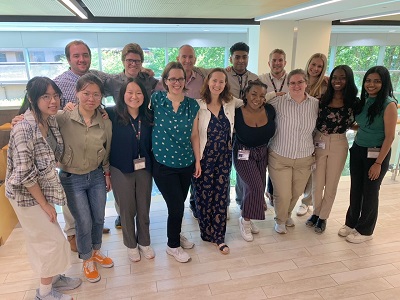 Throughout this summer fellowship, I have overcome numerous obstacles and challenges. In the initial weeks, my lab struggled intensely with expressing and purifying the variant APE1 protein vital for my project. After countless trials and tribulations over two weeks, we finally achieved successful protein expression and purification. In fact, we ended up with more purified protein than originally anticipated. However, our next challenge emerged in crystallizing the variant APE1 protein. Forming high-quality protein crystals is an intricate process requiring much optimization. My mentor Dr. Whitaker patiently guided me through varying precipitant solutions, protein concentrations, and crystallization methods. I learned to approach these difficulties as puzzles to solve rather than barriers. I loved coming to her with new ideas to attempt. Through over a month of troubleshooting, we discovered ideal conditions for producing variant APE1 crystals. The day we first observed crystals under the microscope was tremendously rewarding – our screams of joy could be heard across the entire cancer center. It reminded me why I chose to perform research at Fox Chase and solidified my passion for this career path.
Throughout this summer fellowship, I have overcome numerous obstacles and challenges. In the initial weeks, my lab struggled intensely with expressing and purifying the variant APE1 protein vital for my project. After countless trials and tribulations over two weeks, we finally achieved successful protein expression and purification. In fact, we ended up with more purified protein than originally anticipated. However, our next challenge emerged in crystallizing the variant APE1 protein. Forming high-quality protein crystals is an intricate process requiring much optimization. My mentor Dr. Whitaker patiently guided me through varying precipitant solutions, protein concentrations, and crystallization methods. I learned to approach these difficulties as puzzles to solve rather than barriers. I loved coming to her with new ideas to attempt. Through over a month of troubleshooting, we discovered ideal conditions for producing variant APE1 crystals. The day we first observed crystals under the microscope was tremendously rewarding – our screams of joy could be heard across the entire cancer center. It reminded me why I chose to perform research at Fox Chase and solidified my passion for this career path.
The Empower Fellowship Symposium marked another significant milestone. Presenting my summer's work through an oral presentation was deeply rewarding after the many hours spent optimizing experiments in the lab. Discussing my specific project aims, results, and conclusions with scientists, staff, and even family gave me great confidence as a young researcher. I found tremendous joy in being able to present complex scientific topics to diverse audiences and answer the multitude of questions that arose. The experience also illuminated the importance of effectively communicating science to both specialized and general audiences. Additionally, learning about my fellow student researchers' diverse array of projects was very inspiring. From virology to cancer cell lines, the symposium reminded me of the vast scope of biomedical research. The event marked an important representation of my intellectual and personal growth over the two-month fellowship.
Beyond advancing my research skills, this experience provided an incredibly supportive scientific community. I am sincerely grateful to my patient mentors who passionately invested time in my learning and growth. Their dedication to imparting knowledge and scientific techniques to the next generation of researchers motivates me to pay it forward one day. In particular, the guidance of Dr. Amy Whitaker, Elham Ahanin, Christopher Merlo, Shanae Franklin, and Haley Kravitz was invaluable. My talented fellow student researchers also became close friends and allies, making this fellowship enjoyable beyond just the research itself.
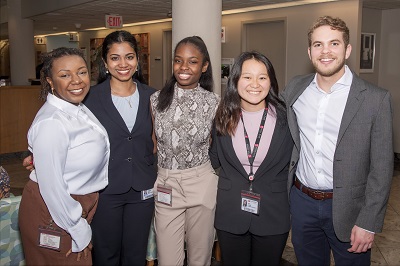 Returning to campus this fall, I plan to approach my classes and goals with fresh eyes. This transformative fellowship reaffirmed and strengthened my aspiration to pursue a PhD in neuroscience research. I am eager to integrate the molecular biology, biochemistry, and DNA repair knowledge gained here into my coursework. My project on the APE1 D283G variant also expanded my interest in studying neurodegenerative conditions like Amyotrophic Lateral Sclerosis. Additionally, the presentations at Fox Chase emphasized the importance of effectively communicating complex scientific concepts to diverse audiences. Moving forward, I aim to continue honing these vital skills.
Returning to campus this fall, I plan to approach my classes and goals with fresh eyes. This transformative fellowship reaffirmed and strengthened my aspiration to pursue a PhD in neuroscience research. I am eager to integrate the molecular biology, biochemistry, and DNA repair knowledge gained here into my coursework. My project on the APE1 D283G variant also expanded my interest in studying neurodegenerative conditions like Amyotrophic Lateral Sclerosis. Additionally, the presentations at Fox Chase emphasized the importance of effectively communicating complex scientific concepts to diverse audiences. Moving forward, I aim to continue honing these vital skills.
When I reflect on my intellectual and personal growth over this short summer, I am reminded of Vincent Van Gogh's profound words on passion and purpose. My time at Fox Chase Cancer Center was fueled by my innate love of science and staunch determination to expand my knowledge. The invaluable lessons, skills, and experiences I have gained here will undoubtedly remain with me wherever my path leads next. I am sincerely grateful for the opportunity to learn, grow, and be mentored among such an inspiring community of scientific minds this summer. Thanks to institutions like Fox Chase that exist to push boundaries and illuminate the way, the path ahead seems brighter than ever.